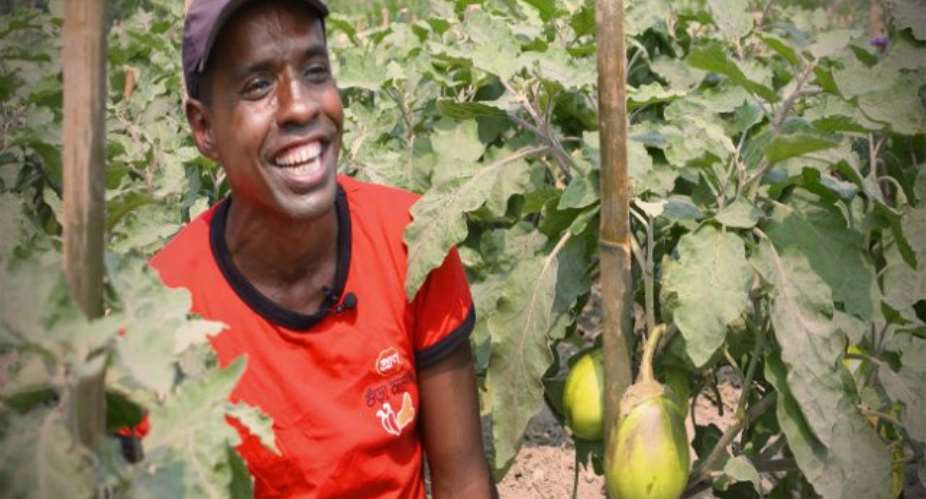Ghanaians are being urged to give Genetically Modified Organism (GMO) technology a chance as a possible tool for dealing with the country’s food security challenges.
International Plant Breeding Professor with US-based Cornell University, Sarah Evanega Davidson says Ghana stands a better chance of being food secure if the country does not close its doors to any of the potential technologies that could help it deal with its food security needs, including GMO technology or biotechnology.
“Farmers should have the chance to choose whether or not they want to adopt new Agric technologies and scientists around the world should have access to the tools they need to meet the great challenges the world face today,” she explained in an interview with Joy News’ Joseph Opoku Gakpo.
She expresses concern biotechnology as a tool for dealing with agricultural challenges has been politicised which is preventing smallholder farmers who need it the most from getting access to the technology.
GMOs are crops produced from seeds which have been altered genetically to introduce desired traits like pest resistance and drought tolerance from other living organisms.
Following the passage of the Biosafety Act 2011 by Parliament, the Council for Scientific and Industrial Research (CSIR) has been undertaking field trials for GM cotton, cowpea and rice as part of regulatory procedures until they are introduced onto the market.
The first batch of GM crops is not expected on the market until after 2018.

Sarah Evanega Davidson
But various Civil Society Groups including Food Sovereignty Ghana have kicked against the planned commercialisation saying it would have negative socio – economic as well as health impacts on Ghana.
The group has in the past sued government in court, organised demonstrations and been engaged in media campaign to whip up support for the technology.
But Sarah Evanega who is Director of the Cornell Alliance for Science Programme says it is about time a decision on the technology is taken based on available scientific evidence instead of denigrating it.
“We need to appreciate this technology on a case by case basis and place by place basis. We need to understand what crop is being developed, the importance of that crop in any particular context, what trait is being introduced.
"Who benefits from this technology? What are the trade-offs? Are there alternatives? And after you dig into all these different aspects, you can begin to make a rational decision on whether or not any particular so-called GMO is good for a country or good for a people,” she explained.

Convention People's Party (CPP) campaigned against GMO
“So for example, whether or not Ghana needs GMO cotton is one question. Whether or not GMO cowpea is good for Ghana is another question. But let’s evaluate those on a case by case and place by place basis... let’s not just think of it as one singular concept of GMOs.
"Let’s be more rational about it and be more evidence-based. Let’s look at the data for each of those crops and see if it the right choice for Ghana,” Sarah Evanega added.
Ghana is considered to be largely food secure but the country still has major agricultural challenges that analysts say require urgent attention.
The level of productivity on Ghanaian farms is averagely less than 40 percent, the country spends more than $2 billion importing food annually and more than GHS400 million worth of food is lost annually through post-harvest losses.
Sarah Evanega is has been commending the University of Ghana for its efforts in undertaking research on the technology.
“There is a great effort at the University of Ghana to invest in the top plant breeders in Ghana to do biotech and give them the skills they need to breed the crops to improve Ghana’s future…
"Let us not discount the fact that there is really promising technology that is being developed in Ghana and for Ghana,” she added.
Story by Ghana | Myjoyonline.com | Joseph Opoku-Gakpo |Joy News





 People are celebrating their 80th birthday and Ghana owes GHS650 billion; who is...
People are celebrating their 80th birthday and Ghana owes GHS650 billion; who is...
 Beige-bank trial: Beige Bank disobeyed BoG — Prosecution
Beige-bank trial: Beige Bank disobeyed BoG — Prosecution
 NACOC staff arrested over cocaine smuggling
NACOC staff arrested over cocaine smuggling
 Controller and Accountant General resigns
Controller and Accountant General resigns
 Election 2024: Mute voices of politicians with 'sharp tongue' — Security Expert ...
Election 2024: Mute voices of politicians with 'sharp tongue' — Security Expert ...
 NDC opts out of Ejisu by-election
NDC opts out of Ejisu by-election
 Recommissioning of Ameri Power Plant an indication of clueless govt – NDC
Recommissioning of Ameri Power Plant an indication of clueless govt – NDC
 Love text message exposes pedophile
Love text message exposes pedophile
 Palm wine tapper kills wife over infidelity at Bogoso
Palm wine tapper kills wife over infidelity at Bogoso
 Dome Kwabenya: Mike Ocquaye washes woman panties for votes
Dome Kwabenya: Mike Ocquaye washes woman panties for votes
